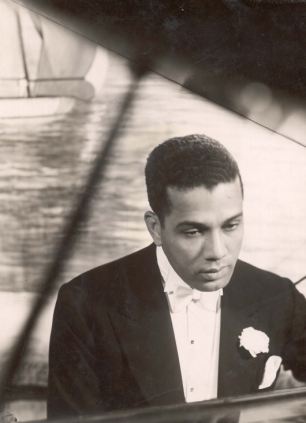

Queer Places:
31 Steele's Rd, London NW3, UK
Highgate Cemetery, 85 Swain's Lane, Camden Town, Greater London N6 6PJ, UK
 Leslie
Arthur Julien Hutchinson, known as "Hutch" (7 March 1900 – 18 August 1969),
was one of the biggest cabaret stars in the world during the 1920s and 1930s.[1]
Leslie
Arthur Julien Hutchinson, known as "Hutch" (7 March 1900 – 18 August 1969),
was one of the biggest cabaret stars in the world during the 1920s and 1930s.[1]
Born in Gouyave, Grenada, in 1900 to George Hutchinson and Marianne (née Turnbull),[2] Hutch took piano lessons as a child.[1]
In 1916, he moved to New York City while still in his teens. He originally emigrated to study for a degree in medicine as he had won a place due to his high aptitude, but instead he began playing the piano and singing in bars. Carl Van Vechten may have been his first male lover.
By the late 1920s Barbara Key-Seymer had become friends with the bisexual Grenadian cabaret entertainer Leslie Hutchinson. From the early 1930s Barbara became good friends with the African American gay entertainer and nightclub host Jimmie Daniels and his boyfriend Kenneth Macpherson, a Scottish modernist filmmaker and critic who earlier in 1930 had directed Borderline, a feature film starring Paul Robeson and Eslanda Robeson. Later in the 1930s Jimmie Daniels and Kenneth Macpherson moved to New York, where they socialized with individuals including Barbara's (by then) ex-girlfriend Olivia Wyndham and Olivia's girlfriend, African American Harlem Renaissance performer Edna Thomas.
In New York City, Hutch joined a black band led by Henry "Broadway" Jones, who often played for white millionaires such as the Vanderbilts, attracting the wrath of the Ku Klux Klan. In 1924 Hutch left America for Paris, where he had a residency in Joe Zelli's club and became a friend and lover of Cole Porter.[3][4] In Paris, Hutch teamed up with the singer/dancer Ada Smith, who was popularly known as ‘Bricktop’ because she was a redhead; he worked as her accompanist as she taught whites how to dance.
Encouraged by Edwina Mountbatten, he came to England in 1927 to perform in a Rodgers and Hart musical, and soon became the darling of society and the population in general. Hutch was a favourite singer of the then Prince of Wales (later King Edward VIII). Hutch was one of the biggest stars in Britain during the 1920s and 1930s, and was, for a time, the highest paid star in the country.[1] He was regularly heard on air with the BBC. One of his greatest hits was "These Foolish Things".
In spite of his popularity, Hutch could not escape racial prejudice:
He bought a Rolls-Royce, a grand house in Hampstead, patronised London's best tailors, spoke five or six languages and was on friendly terms with the Prince of Wales. But he was still a black man in an era of racial discrimination. When he entertained at lavish Mayfair parties, his fee was large, but he was often obliged to go in by the servants' entrance. This embittered him.
— Thornton[4]
Hutch recorded several of Cole Porter's songs, including "Begin the Beguine" and Porter's list song "Let's Do It (Let's Fall in Love)", to which he supposedly made up some 70 new verses.
Hutch was "one of the first stars in Britain" to volunteer to entertain the troops at home and abroad during World War II, but he received no formal recognition for his service, and his name would never appear in any Honours list.[4]
He married Ella Byrd, a woman of African, English, and Chinese ancestry, in 1923 or 1924 in New York City.[2] Their daughter, Lesley Bagley Yvonne, was born on 9 April 1926. He fathered seven further children with six different mothers. Gordon was born in August 1928, Gabrielle in September 1930, Jennifer in October 1939, Gerald and Chris in 1948, and Graham (Chris's full brother) in 1953, and Emma in April 1965.[2][5]
In 1930, one of Hutch's mistresses, British debutante Elizabeth Corbett, was discovered to be pregnant with his child.[4] Her family tried to hush up the affair, hastily marrying Corbett off to an army officer, and attempting to pass off the child as his. When the child was born, however, and discovered to be of mixed race, Corbett's husband refused to acknowledge her as his own.[4] She (Gabrielle) was put up for adoption and Corbett's outraged father sued Hutch.[4]
Hutch is rumoured to have had a lengthy affair in the mid-1930s with Edwina Mountbatten. The rumour scandalized the British upper classes, becoming the subject of tabloid news, and an embarrassment to Lady Mountbatten's royal in-laws. The Mountbattens sued the tabloids for libel.[4] As a result of the scandal, Hutch was shunned by many of his former patrons.[4]
After The People case, Buckingham Palace refused to have him on any Royal Command Performance bill, and Lord Beaverbrook gave orders that Hutch's name was never to be mentioned again by any of his papers.
— Thornton[4]
Another of his reported mistresses was actress Tallulah Bankhead — an openly bisexual Golden Age Hollywood actress. Hutch may have been bisexual and was alleged to have had relationships with Cole Porter, Ivor Novello, and Merle Oberon.[2]
In Barbara Key-Seymer's personal photo album from 1936 we also see that during the 1930s she was friends with singer, actress and performer Elizabeth Welch. Born in 1904, Elizabeth Welch was an American of African, Native American, Irish and Scottish heritage. Stephen Bourne's insightful biography of Welch records her experiences in 1930s London. During this time she performed in musicals and cabaret, and starred on radio, on television and in films alongside actors including Paul Robeson. She was good friends with Leslie Hutchinson, socialising with him, as she recalled in "the marvellous late-night dives of Soho which, in those days, attracted all the stars and theatregoers."
Leslie Hutchinson suffered from ill-health in his later years and died in London from pneumonia on 19 August 1969. Forty-two people attended his funeral.[4]
My published books: